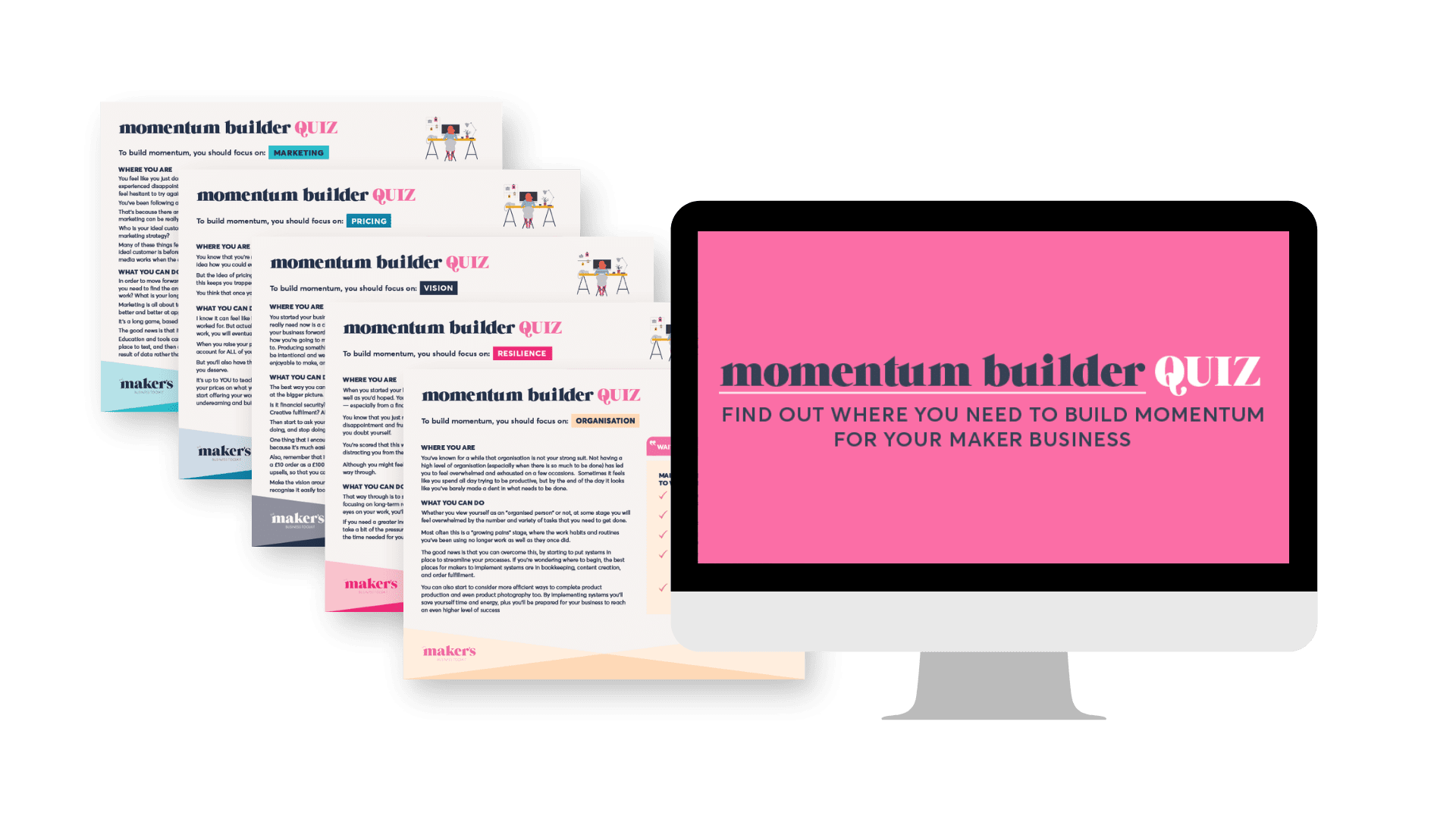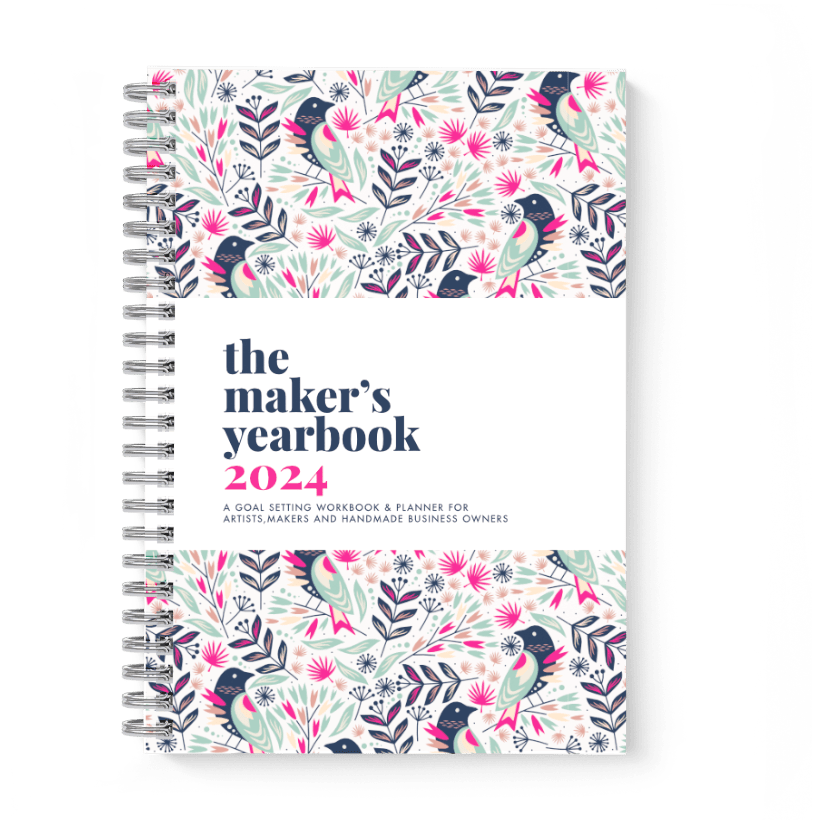In 2016 there were not one, but two shocking election results that resulted in the world stock markets moving sharply downwards.
These shocks have caused people to be very concerned about the economy and, in some cases, fearful for the future.
You might be one of those people or you might not. This post is not about politics.
It does not matter if those people fearful for the future are right or wrong. It does not matter if their predictions become reality or not. Right now they are concerned about the economy.
And when people are concerned about the economy and fearful for the future they behave very differently as consumers than they do when they are not concerned and not fearful.
Whether the uncertainty is triggered by an election, a war, an act of terrorism, a business bankruptcy, or worries that the good times being experienced are coming to an end, the result is the same. People become uneasy about their future and that can lead to a recession.
How does this affect us as makers?
For the most part the products that we sell are very affected by consumer confidence and the amount of money the general public have now and expect to have in the next few months.
As businesses owners that sell products which are easily given up in tougher economic times, we can’t ignore the economy and expect our businesses to flourish.
People see the stock markets falling. They might hear about their company having a hiring freeze and start to get uneasy. They may notice that the business they work for is quieter than usual. They may see their company starting to lay people off. They might hear about businesses filing for bankruptcy and worry that their own company might be in trouble.
People who are concerned about losing their job don’t make large purchases.
People who are concerned about their jobs don’t redecorate their houses, or move house, or go on holiday.
They are distracted. Their social media time is spent discussing political or world events, or arguing about who is to blame for these world events.
They are not shopping.
And that is bad for businesses who sell products which are not necessities.
But, if we can understand what our customers are thinking, feeling and experiencing, we can figure out a way through it and adapt our businesses to be the strongest they can be, even in challenging times.
Makers are tough and resourceful. No one who wasn’t would have got this far.
I worked in the stock market for a number of years, including the years of the global financial crisis when even my boss, a 30 year industry veteran, had never seen anything like it.
Whether the market was moving up, down or sideways, our clients were managing the retirement savings of a huge number of people and they needed to find a way to make money. A lot was riding on it.
A lot is riding on your success too. You are managing your future and the future of your family and you need to find a way to help your business make money, even when times are tough.
So let’s sit down and think through what an economic downturn might mean for our businesses and how we can adapt.
First things first. You will have to deal with your own emotions about the event which triggered this downturn, whatever it may be.
Some events will be disturbing, upsetting, horrifying. Some may not make very much sense.
Sometimes it might seem like a fairly minor event has caused a big reaction.
You might be experiencing a lot of the same fears your customers are experiencing.
You might feel angry that this has happened and that your business and your livelihood is being threatened by something out of your control, or by something that could have turned out differently.
All of these are completely valid and understandable reactions. As a citizen it’s completely reasonable for you to get emotional about world events.
But if you want to think clearly about what to do next, you need to set all of this aside for a moment. Put on your business CEO hat for a few minutes.
As a private citizen, there are a lot of things you might be concerned about.
But as the CEO of your business, you have only one concern. How to keep your business running and bringing in enough money to support the lifestyle you want.
Ok. Let’s dig in.
A recession means a period of economic growth that is negative for at least six months.
Economic growth just means the value of all the goods and services sold by a particular country in a particular period of time.
So a recession basically means that, for an extended period of time, most or all businesses are selling less than they were in the previous year.
And that means us too!
Six months might not sound like a long time but some businesses will see declining sales for longer than that and even six months of job uncertainty can have a powerful effect on people’s spending habits.
Imagine fearing for your job for at least six months. Wondering if you’d be able to get another one and thinking about how long you’d be able to keep paying the mortgage before you got into trouble?
How long would it take you to feel secure enough again to think about freely spending the money that comes in, rather than squirrelling it away for a rainy day?
Six months? A year? Two years?
And when you started to free up your purse strings again, what are you most likely to spend money on? I would guess that a holiday or a treat for the kids would be the priorities.
So which parts of your business are most at risk in a recession?
Sit down and write down all of the items you sell that you think might sell less well because of the economic situation.
For example, the sale of larger pieces of framed wall art is often tied to people buying new homes and redecorating their existing homes.
Are your pieces very expensive?
Often the very high end of the market is actually the most resilient, even in a recession, but it’s worth keeping an eye on this because it’s not always the case.
You can watch the luxury goods market to see how strong the demand is for high end goods and you should also consider the types of companies that employ your customers or your customers’ partners.
Are they in banking? Management consultancy? Oil and Gas? Are they tech companies?
Watch out for high profile bankruptcies, layoffs and restructuring in these industries as well as changes to tax law for indicators that you might see your sales slowing, even if you serve customers at the high end of the market.
If your pieces are expensive but not aimed at very high end consumers, you might need to broaden your range to include some lower priced products too.
Is the recession concentrated in one part of the world?
Can you try to sell your products in other countries where perhaps consumers are a little bit more confident about their prospects, or can you try to diversify your customer base so you have some customers in lots of different countries to try and protect yourself from the risk?
Makers might see sales of their products slow down right at the beginning of a recession as people reduce their spending, and they may be one of the last things to recover once the economic uncertainty has passed.
Wholesale might also be a bit more challenging.
During a recession, you might find that your wholesale business becomes a lot more difficult to predict.
Retailers have the same anxieties that everyone else does when sales are slowing.
Some might look to stand out by seeking out new products and you might benefit from that.
Some might become more conservative with what they order, sticking with established trends and unwilling to give something different a chance, and you might suffer from that.
Some might decide to hold off on ordering anything new until they’ve sold what they’ve got, and you might suffer because of that.
Some might decide to reduce the number of makers they work with and you might lose out because of that (or benefit because you now get a bigger proportion of the sales).
The bottom line is that you can’t completely rely on retail. If you haven’t got a website from which people can purchase yor products, or at the very least an Etsy Store, now is the time to make that a priority.
Which areas of your business are likely to be more resilient?
1. Affordable luxury and affordable joy.
Even in a recession, people still spend money on things that are not strictly necessary.
We all need a little treat every now and again, especially when times are tough, but these treats tend to fall into the category of affordable luxuries and things we buy to cheer ourselves up.
This is sometimes called the “lipstick effect.”
The Chairman of Estee Lauder noted that lipstick sales generally go up in a recession, rather than down, because it’s a small purchase that replaces a larger purchase.
So, instead of buying a dress, we buy a new lipstick for a quick affordable update to our look.
Mascara, nail polish and home hair colourant sometimes exhibit the same kind of effect.
What do you have in your product line that could be considered an affordable luxury? Can you reposition your marketing to focus more on this item? Can you add more products that feel like an affordable treat?
Remember it doesn’t actually need to be particularly low priced, it just needs to be a replacement for a higher priced item.
Another area that people focus on during a difficult period economically is the need to seek out comfort and joy. So products that offer a little bit of cheer can still do well.
Comfort food and eating, nostalgia and humour are key themes that work well.
So think about a special mug to enjoy your morning coffee or fun, uplifting illustration and work that draws on brands familiar from childhood.
Be aware that the manufacturers of mass produced goods will also be chasing these themes and producing products at lower prices than small makers can, so make sure you consider how you’ll make your work stand out.
2. Products for children
And, of course, one of the most resilient areas of the consumer economy is products for children.
It’s absolutely true that parents will cut back on what they spend on themselves in order to keep buying for their children.
So if your product line includes products for children, you may find that this portion of your business is more resilient.
Of course this is perhaps only true if the children themselves are driving the purchases, so those of you who make high end children’s clothes would need to assess these more like a general luxury product than a product for children.
3. Eating in
Keeping with the theme of reducing spending by treating yourself in more affordable ways, many people choose to cut down on eating out and do more entertaining at home.
This might actually help you if your products are functional or if you produce beautiful tableware that can also be classed as affordable luxury.
4. Giftware
People still need to give gifts during periods of economic stress but they may be smaller, lower priced items.
What can you do to present more of your items as gifts?
Can you update your gift packaging to give some of your smaller items that affordable luxury feel?
Can you package together one or two smaller items to create a gift box?
Make your marketing do the work of showing people how your products can be given as gifts and be sure to get in front of your customers at key gift giving times.
It’s not all about Christmas too – don’t forget that there are gifts to be given around Valentine’s Day, Mother’s Day, Father’s Day and Graduation, as well as birthdays, weddings and anniversaries all year long.
Here are some tips for reducing the impact of an economic downturn on your handmade business.
1. Diversify as much as possible
Sticking to just one way of selling to customers is always risky, but even more so when times are tough.
If you’re getting a large proportion of your income from craft fairs or from wholesales, or from a particular marketplace or a paricular customer, you probably want to do something to reduce the risk to your business.
Likewise, if one product accounts for a large proportion of your income, or one social media platform accounts for almost all of your website traffic then you’ll want to address those issues too.
Of course diversification is always a double edged sword when you are running a business by yourself or with a very small team.
You might not have the resources to fully support wholesale, AND sale or return, AND direct sales from your website AND produce a larger number of products AND post on more social media sites.
You don’t have to do everything, but it’s never a good idea to have all your eggs in one basket.
At the least make sure you have more than one way of selling to customers and you have more than one way of communicating with them.
2. Your marketing will need to be strong
During a recession it will be harder to connect with your customers because there will be lots more noise to cut through, whether it is the news flow or the distraction that comes from worrying about the future.
So you will need to make sure that your marketing message is strong, your product photographs are compelling and that you are consistently reaching out to your customers, both on social media or through your email marketing.
This isn’t the time to sit back and hope. Draw up a marketing plan that plays well with one of the themes we have mentioned and stay consistent with it.
3. You really need to know your customers
It’s really important to know the types of people who buy from your business so that you can understand how they are affected by what is happening in the world.
Do they work in industries that are at risk?
Do they have enough disposable income to maintain their spending after a 10% increase in petrol or food prices?
Will interest rate changes affect their ability to get a mortgage or even pay their mortgage?
We can’t know everything about our customers but we do need to at least consider what they might be thinking and feeling in a weak economy.
If you don’t even know where to start with this, a really good free tool is Facebook’s Audience Insights tool (I recorded a video here to show you how to use it).
You won’t be able to view insights for your own customers unless you’ve got a huge following but you can look at big businesses you believe have similar customers to you.
Facebook gives pretty interesting demographic data that might give you a starting point – although you’ll want to make sure to collect as much information as you can about your own customers too so you can build a solid profile.
4. Don’t just hope it will get better soon
It takes quite a while for things to recover following a recession, and sometimes things are never quite like they were.
The time it takes for the economy to recover varies dramatically from recession to recession but typically it is at least two years. So it’s not something you can just hope to ride out.
It’s always tough to tell which changes in customer behaviour are temporary and which are permanent so it’s best to adapt quickly. The quicker you adapt to the current trading conditions, the more you’ll keep the cash flowing into your business and the better you’ll sleep at night.
5. Cut back on costs
Anything you can do to reduce your outgoings will help you to ride out any periods of weaker sales. So don’t wait.
As soon as you notice your sales starting to slow, make cuts where you can.
Inventory is a good place to start. Can you keep a smaller amount of materials on hand? Have you looked around to make sure you are getting the best prices? Can you adapt your products so that you use the same materials across several different products? Standardising sizes across your product lines can help with this.
For example, if you’re a photographer like me, having all of your images the same dimensions means that you can order mounts and frames and use them across all of your products. You can also buy just one size of box for shipping your products.
Monthly overheads are also a good place to look for savings. Go through your statements and write down all of your recurring bills. Look at each one and decide if you really need the product or service. You may even find some that you didn’t know you were paying for.
6. Try to stay positive
When you have worked so hard to build up your business and something comes along and just blows it all out of the water it can be really disheartening.
It’s easy to feel quite angry and upset about it all but just know that recessions are a natural part of the cycle of the economy and they do happen even without a big triggering event.
And while you are feeling upset and angry, you’re not focused on what needs to be done.
Periods of economic weakness are painful for everyone but remember that you can do things to lessen the impact. The key is being adaptable.
There’s a quote which is often misattributed to Charles Darwin but which actually came from a university business professor who was talking about the Origin of the Species and its application to business and social sciences.
His name was Leon Megginson and he said:
“Yes, change is the basic law of nature. But the changes wrought by the passage of time affect individuals and institutions in different ways.
According to Darwin’s Origin of Species it is not the strongest of the species that survives, nor the most intelligent that survives.
It is the one that is most adaptable to change.”
The economy is always moving, always changing, and it affects us all. But we’re not powerless and we’re not all affected in the same way. How you navigate through the economic cycle, with its ups and downs, and how quickly you adapt to provide products that your customers want to buy and are able to buy during these times of uncertainty determines how successful your business will be over the long term.
It’s more in your hands than it might seem.









